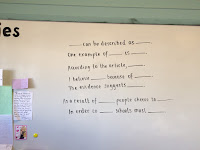If you have ever had the opportunity to see Ms. Anderson in action, you understand how lucky we are to count among us such a gifted educator. Her colleagues in BIHS know how humble she is, so she would never toot her own horn, but as I have had the opportunity to observe her on three different occasions, I can attest to her extraordinary ability to hold high expectations in an engaging, relaxed atmosphere.
Ms. Anderson also recognizes the need to scaffold her instruction so that students at every level can access her curriculum. One of the ways she does this consistently is by making use of her Constructing Meaning PD training from this year. On any given day, an observer could walk into Ms. Anderson's classroom and witness a veritable cafeteria of approaches to improve the academic language of our students.
Each day, Ms. Anderson posts a learning goal and an agenda that includes the academic language her students will be expected to produce. Here is a snapshot of her white board from a typical assignment. When I first observed Ms. Anderson's well-organized class, I found myself thinking about how I could more effectively articulate student learning goals and explicitly teach academic language skills to my students.
Another thing that impressed me about Ms. Anderson was her ability to clearly convey assignment instructions to students. She communicates instructions both verbally to the whole class and in writing on her white board. She is also adept at checking for understanding. She generously invites students into her classroom for help during lunch and after school, and provides differentiation for all.
When I observed Ms. Anderson in September, her ninth-grade students (she teaches four sections of ninth grade English) were writing memoirs. Her "kick-off" instructions on her board read: Have out your memoir notes and your memoir. Today classmates will be reading your memoir and giving you feedback. Look over the memoir characteristics in your notes. With these things in mind, what about your memoir do you want your group-mates to help you with? Write your needs at the top of your memoir. Throughout this observation, I noted that Ms. Anderson was confident, relaxed and comfortable with her students – her explanations were lighthearted, funny and sometimes self-deprecating. When she caught the eye of a giggly student, she smiled and asked him, in wry mock-embarrassment, “Why are you laughing?” This is typical of her interactions with students, and one of her most endearing qualities. She then reviewed instructions for peer feedback and lay out parameters for groups. She gave students a few minutes to get in groups and then used a soft bell to end the group selection process. She explained the facilitator role and handed out peer feedback instructions and an example memoir with her comments. While the students were in the peer feedback process, she floated around with a clipboard to check group progress, giving students credit for their brainstorm and draft. At the end of the period, Ms. Anderson asked the students to complete a writing process exit slip incorporating academic language frames as a way to review the stages of the writing process. It was interesting to note that Ms. Anderson provides these frames with the caveat that "you only have to use these if you need them." On another observation, I was surprised to see that when she made sentence frame handouts available to her students for essay-writing support and repeated this caveat, an overwhelming majority of her class got up to get a copy of the handout.
I also had the opportunity to interview some of Ms. Anderson's students, who shared these comments about their teacher: "She makes learning more fun and interesting." "She's always really happy, and it makes you happy." "She's really friendly and very supportive." "Her happy vibe is contagious." "She breaks things down if you don't understand." "She's good at clarifying herself and helping you one on one if you need help." "She'll do anything to help you achieve what you need to achieve." "In a lot of classes, I don't understand what's going on, but in this class, she explains everything step-by-step." "It is a challenging class, but she helps you out so that it's easier for you to do the challenging stuff."
Based on my observations, it is easy to see why Ms. Anderson's colleagues nominated her for recognition. She is creative, energetic, organized, and inspiring. In a word, exceptional. Congratulations, Ms. Anderson. BHS is lucky to have you.





Awesome getting this up Susannah. And keep up the good work Jordana. You ARE making a bigger difference than you might imagine in students' lives whether they let you know or not!
ReplyDelete